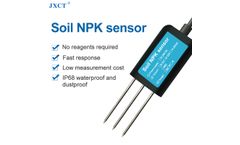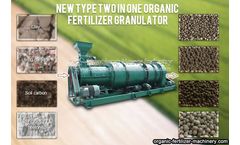Soil Npk Sensor Soil Articles & Analysis
12 articles found
Potassium, regulating water balance and enzyme activity, contributes to drought tolerance, stress resistance, and overall plant health. The Role of Soil NPK Sensors Soil NPK sensors, non-invasive devices that directly measure nutrient levels in the soil, have become invaluable ...
Soil NPK Sensors: A Precise Tool for Plant Nutrition Soil NPK sensors are high-tech tools that measure the levels of nitrogen (N), phosphorus (P), and potassium (K)—the three key nutrients essential for plant growth—in the soil. ...
ByJXCT
Introduction:With the continuous development of science and technology, the agricultural field has gradually realized modernization and high efficiency. In order to better improve the yield and quality of crops, we need to carry out accurate and rapid detection of soil nutrient status. Therefore, choosing the right soil nutrient detector has become an important link in agricultural production. ...
ByJXCT
Soil NPK sensors are devices that measure the levels of nitrogen, phosphorus, and potassium (NPK) in the soil. ...
Soil NPK sensors are devices that measure the levels of nitrogen, phosphorus, and potassium (NPK) in the soil. ...
Background: Soil is one of the most important natural resources on Earth. It plays a vital role in agriculture, supporting the growth of crops and plants and providing us with food, clothing and shelter. However, the quality of soil depends on various factors such as location, weather and environmental factors. Therefore, it is important to understand the properties of the soil before planting ...
Background:Portable Soil Detector is a smart handheld Soil data recorder. Usually used with different soil sensors, such as soil moisture sensor, soil temperature and humidity sensor, soil three-in-one sensor, ...
Background: When people think of salt in relation to crops, the impression is that salt is bad for plant growth. However, it must be remembered that whenever we apply fertilizer, we are adding salt to the soil. So, when measuring soil salt, it can be a case of too much or too little. If the salinity is too high, the roots cannot absorb water. If the salinity is too low, the plants may lack ...
Product Description: Portable Soil Detector is a smart handheld Soil data recorder. Usually used with different soil sensors, such as soil moisture sensor, soil temperature and humidity sensor, soil three-in-one sensor, soil nitrogen, phosphorus and potassium sensor, soil ph sensor or multi-depth soil hygrometer. The soil analyzer can store 100W of data at a time. Built-in rechargeable battery, ...
The humus in organic fertilizer increases the content of soil organic matter, which is beneficial to the formation of good soil structure, especially the increase of water stable aggregate structure, so as to improve the tightness, aeration, water retention and heat status of soil, and has a good effect on the water, fertilizer, air and heat conditions that determine the soil fertility. It is ...
The objective of this work was to determine how some wastewater acids could be used to prevent the decomposition of urea into ammonia during storage. The effect of storing human urine with olive oil mill wastewaters (OOMW) or water bubbled with CO2 (BW), was studied. Moreover, the application of two levels of urine dissolved in water OOMW, has been studied in relation to the properties of two ...
A field plot experiment was conducted on two types of paddy soils in the Taihu Lake Region of China from June 2000 through 2002 to assess phosphorus (P) losses by runoff and drainage flow and the effectiveness of rice–wheat double cropping on reducing P losses from paddy soils. Commercial NPK compound fertilizer and single superphosphate fertilizer were applied to furnish 0, 30, 150, and 300 kg P ...






